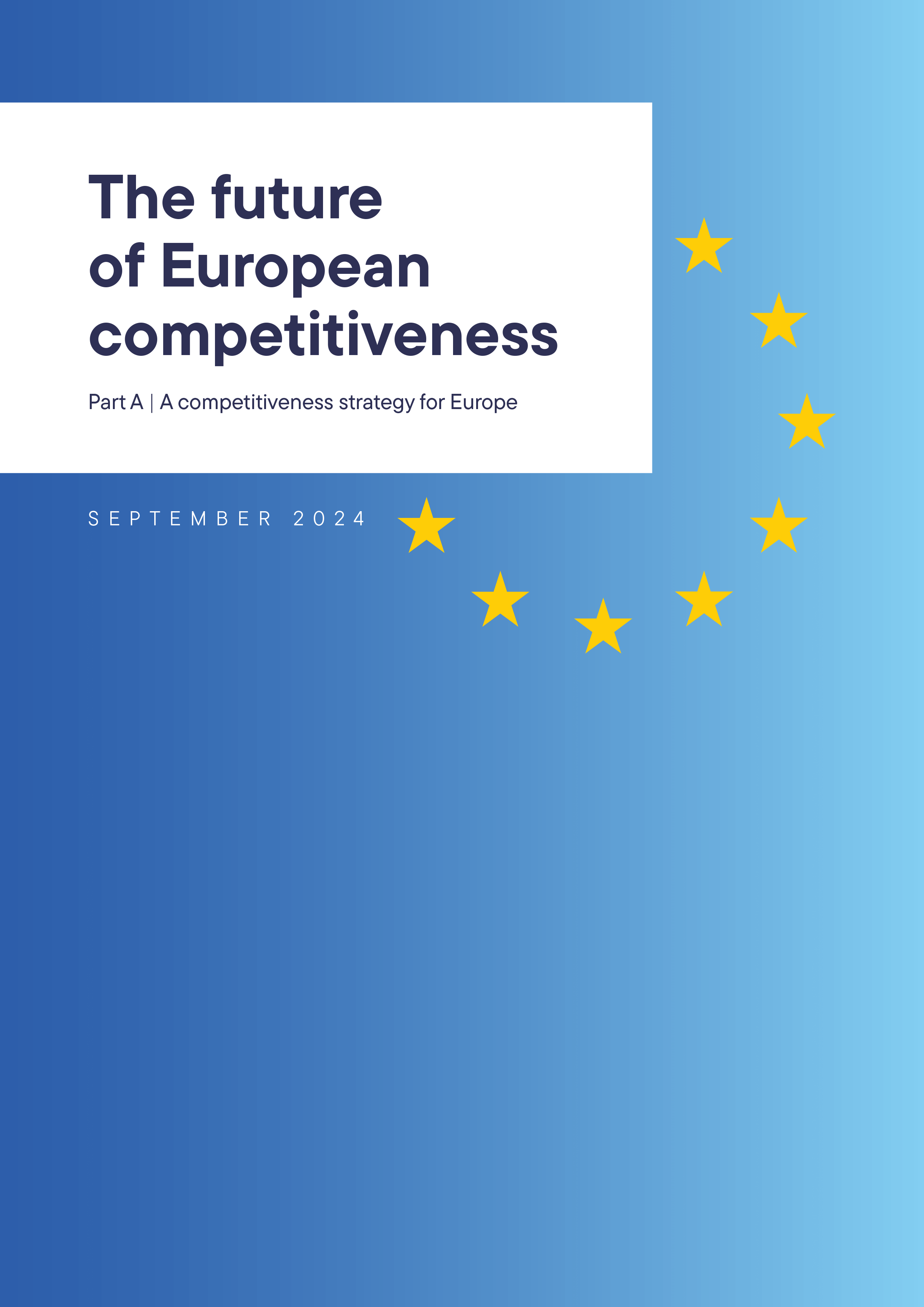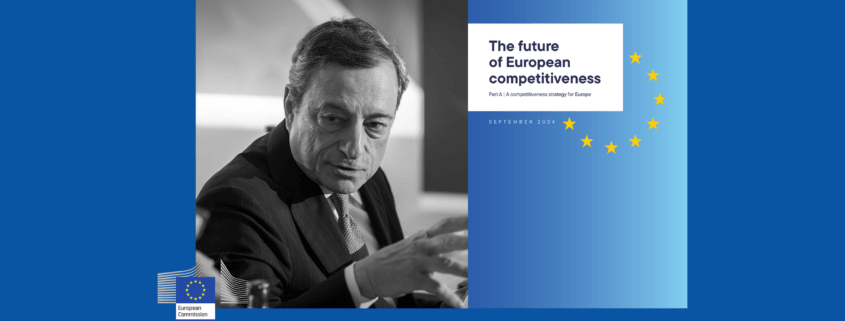Europe needs leadership, Artificial Intelligence, and social inclusion, says Mario Draghi
The long-expected report by Mario Draghi, The Future of European Competitiveness, offers a detailed strategy for confronting mounting challenges.

Download: The future of European competitiveness – A competitiveness strategy for Europe [+]
In general terms, Draghi’s goal was to provide the European Commission with a clear way ahead towards a more competitive EU.
Draghi‘s report emphasizes the critical role of leadership, the importance of investing in Artificial Intelligence (AI), and a more effective and proactive citizens’ involvement in social dialogue, combining trade unions, employers, and social partners and building the consensus needed to drive the changes.
Transformation can best lead to prosperity for all when accompanied by a strong social contract.
Mario Draghi
The Future of European Competitiveness
Skills shortages, also among EU leaders
Draghi showcases rising energy costs, technological disruption, geopolitical shifts, and shortage of skills among the many significant pressures for the European Union.
77% of newly recruited employees often lack the required competencies
In fact, the report identifies skills shortages as a critical issue affecting the European economy. Various sectors and different skill levels are affected by it.
Around 25% of European companies report difficulties in finding employees with the right skills, and approximately 77% of EU companies highlight that even newly recruited employees often lack the required competencies.
This shortage is not limited to low-skilled workers but also affects high-skilled professions, particularly in industries like information and communication technology (ICT), which are vital for innovation and growth.
The report emphasizes that skills gaps extend to managerial levels, where the adoption of modern management practices, especially those related to human capital and technology integration, is lagging.
25% of European companies report difficulties in finding employees
The slow uptake of these practices and integration of new digital skills throughout the labour market, particularly in micro and small businesses, has hindered sectors like ICT and overall innovation within the EU.
This problem is further compounded by demographic headwinds in Europe, where the working-age population is shrinking.
This demographic decline, combined with the skills gap, threatens both social mobility and economic growth, creating an urgent need for comprehensive strategies focused on education, retraining, and lifelong learning to ensure the workforce can meet the demands of a rapidly changing economy.
The report argues that one solution for fostering the EU’s competitiveness lies in equipping European managers and leaders with the skills and strategies to steer their industries toward innovation and inclusivity.
The European leadership community, represented by CEC European Managers, is identified as a cornerstone of the continent’s future economic success.
According to the report, managers must rise to the challenge of navigating industries through decarbonization, digital transformation, and heightened global competition. At the heart of this leadership crisis is the slow adoption of AI technologies and modern management practices, particularly in small and micro-businesses.
These gaps hinder Europe’s competitiveness in information and communications technology (ICT) sectors.
As the global race in AI accelerates, European managers are tasked with implementing these technologies and ensuring that their workforce is equipped with the skills to adapt and thrive in a rapidly evolving job market.

Artificial Intelligence: EU’s momentum
AI is heralded as a transformative force capable of revolutionizing the pharmaceuticals, automotive, energy, and transport industries. For instance, AI can optimize everything from vehicle design to supply chain logistics, potentially unlocking billions in economic value.
Also, according to Mario Draghi, AI is a great opportunity for the European Union, which depends too much on China and the United States, and can foster its independence and autonomy through AI innovation.
For instance, while the gap in GDP per capita between the European Union and the United States (measured in purchasing power parity) has risen from 31% in 2002 to 34% in 2023, EU companies spent EUR 270 billion less on research and innovation (R&I) than US companies.
This has direct consequences for the European Union’s innovation ecosystems. For instance, between 2008 and 2021, nearly 30% of European “unicorns” (startups valued over USD 1 billion) moved their headquarters abroad, primarily to the US. Currently, in 2024, only 4 of the world’s top 50 tech companies are European.
The report warns that without proper managerial oversight, AI could exacerbate social inequalities, leaving workers without the skills needed for an AI-driven economy.
Only 4 of the world’s top 50 tech companies are European
The report calls for a strong focus on lifelong learning, ensuring that workers across all sectors can benefit from AI advancements rather than being displaced by them. Furthermore, Draghi emphasizes the need for Europe to balance innovation and regulation, particularly through frameworks like the AI Act, which seeks to govern the development and deployment of AI technologies.

“While regulation is necessary to ensure ethical standards and protect citizens’ rights, overly restrictive policies could hinder technological advancements and stifle innovation.”, says the report, as it calls for a pragmatic approach to AI regulation.
The goal is to create an autonomous European system where economic growth and social equity coexist, allowing Europe to remain competitive globally while upholding its social values.
Social Dialogue and the European Pillar of Social Rights
The report highlights the importance of social dialogue as it ensures that Europe pursues competitiveness through innovation and decarbonization while sharing the benefits broadly across society.
Europe has the potential to not only keep pace with global competitors but to lead the way in creating a sustainable and inclusive economy.
The European Pillar of Social Rights, integral to this approach and the social market economic model, guarantees fair labor conditions, access to education, and equal opportunities for all citizens.
EU Pillar of Social Rights infographic [+]
Draghi‘s report supports this model as a vital framework for preserving Europe’s welfare systems while driving economic reform.
Using our leadership
CEC European Managers calls its member organisations, sectorial federations, and the rest of the EU leaders to shape the continent’s competitive strategy actively.
As greater coordination among EU member states to avoid policy fragmentation and a more concerted effort in leadership development are needed, EU managers must be equipped to guide their organisations through the technological, environmental, and geopolitical transformations on the horizon.
This will foster economic growth and ensure that Europe remains a global leader in sustainable, inclusive development. Initiatives such as the European Project Beyunbi – Beyond Unconscious Bias – led by CEC European Managers – are already fostering a new generation of better-trained decision-makers.
European competitiveness will depend on the strength and adaptability of its leaders. Managers, alongside policymakers and social partners, are at the forefront of driving innovation, integrating AI, and maintaining a strong social contract.
With coordinated leadership and strategic action, Europe has the potential to not only keep pace with global competitors but also lead the way in creating a sustainable and inclusive economy.
The Future of European Competitiveness underscores that success in this journey will require a collective investment and commitment towards a productive economy—from leaders at the helm of the industry to the social dialogue ensuring every citizen benefits from Europe’s growth.
According to former President of the European Central Bank, Mario Draghi, “a 2% increase in total factor productivity within ten years could cover up to one-third of the required fiscal spending for investments”.





